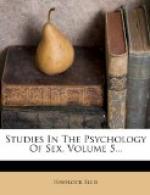and during coitus observations were made on the blood-pressure
at the peripheral and central ends of the artery.
It was found that there was a great general elevation
of blood-pressure, intense hyperaemia of the brain,
rapid alternations, during the act, of vasoconstriction
and vasodilatation of the brain, with increase and
diminution of the general arterial tension in relation
with the various phases of the act, the greatest cerebral
vasodilatation and hyperaemia coinciding with the
moment following the intromission of the penis; the
end of the act is followed by a considerable fall in
the blood-pressure.[111] I am not acquainted with
any precise observations on the blood-pressure in
human subjects during detumescence, and there are
obvious difficulties in the way of such observations.
It is probable, however, that the conditions found
would be substantially the same. This is indicated,
so far as the very marked increase of blood-pressure
is concerned, by some observations made by Vaschide
and Vurpas with the sphygmanometer on a lady under
the influence of sexual excitement. In this case
there was a relationship of sympathy and friendly tenderness
between the experimenter and the subject, Madame X,
aged 25. Experimenter and subject talked sympathetically,
and finally, we are told, while the latter still had
her hands in the sphygmanometer, the former almost
made a declaration of love. Madame X was greatly
impressed, and afterward admitted that her emotions
had been genuine and strong. The blood-pressure,
which was in this subject habitually 65 millimeters,
rose to 150 and even 160, indicating a very high pressure,
which rarely occurs; at the same time Madame X looked
very emotional and troubled.[112]
Some authorities are of opinion that irregularities in the accomplishment of the sexual act are specially liable to cause disturbances in the circulation. Thus Kisch, of Prague, refers to the case of a couple practising coitus interruptus—the husband withdrawing before ejaculation—in which the wife, a vigorous woman, became liable after some years to attacks termed by Kisch neurasthenia cordis vasomotoria, in which there was at daily or longer intervals palpitation, with feelings of anxiety, headache, dizziness, muscular weakness and tendency to faint. He regards coitus as a cause of various heart troubles in women: (1) Attacks of tachycardia in very excitable and sexually inclined women; (2) attacks of tachycardia with dyspnoea in young women, with vaginismus; (3) cardiac symptoms with lowered vascular tone in women who for a long time have practised coitus interruptus without complete sexual gratification (Kisch, “Herzbeschwerden der Frauen verursacht durch den Cohabitationsact,” Muenchener Medizinisches Wochenschrift, 1897, p. 617). In this connection, also, reference may probably be made to those attacks of anxiety which Freud associates with psychic sexual lesions of an emotional character.




